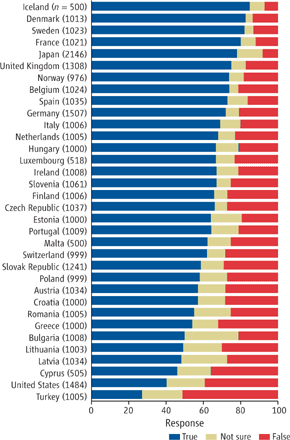Whew!

Public opinion on Evolution by country
Well, at least we beat Turkey!
[Via livescience], a comparative study of beliefs about evolution in 34 countries. Were it not for the Turks, the US would have finished dead last.
The authors of the study found the usual suspects — the peculiar American brand of Protestant Fundamentalism, with its emphasis on biblical literalism, and the use of creationism as a political wedge-issue by the Right — as largely responsible for the difference between the US and other countries. (In the US, there were significant correlations between self-description as “conservative”, opposition to abortion and disbelief in evolution. Not so in Europe.)
More hopeful, at least to me, was simple knowledge of modern genetics as a predictor:
Third, genetic literacy has a moderate positive relationship to the acceptance of evolution in both the United States and the nine European countries. This result indicates that those adults who have acquired some understanding of modern genetics are more likely to hold positive attitudes toward evolution. The total effect of genetic literacy on the acceptance of evolution was similar in the United States and the nine European countries.
Although the mean score on the Index of Genetic Literacy was slightly higher in the United States than the nine European countries combined, results from another 2005 U.S. study show that substantial numbers of American adults are confused about some of the core ideas related to 20th- and 21st-century biology. When presented with a description of natural selection that omits the word evolution, 78% of adults agreed to a description of the evolution of plants and animals (see table S2 in SOM). But, 62% of adults in the same study believed that God created humans as whole persons without any evolutionary development.
It appears that many of these adults have adopted a human exceptionalism perspective. Elements of this perspective can be seen in the way that many adults try to integrate modern genetics into their understanding of life. For example, only a third of American adults agree that more than half of human genes are identical to those of mice and only 38% of adults recognize that humans have more than half of their genes in common with chimpanzees. In other studies (1, 14, 15), fewer than half of American adults can provide a minimal definition of DNA. Thus, it is not surprising that nearly half of the respondents in 2005 were not sure about the proportion of human genes that overlap with mice or chimpanzees.
It would be amusing to cross-correlate these results with those international surveys of test scores in math and science. One’s cursory impression is that the same countries rank near the top (and near the bottom) of both data sets. That Johnny doesn’t know what DNA is is probably not unrelated to the fact that he can’t do simple algebra either.
Posted by distler at August 12, 2006 8:43 PM
Re: Whew!
Looking at the very top of that graph reminds me of a poem by Jorge Luis Borges which begins, “How grateful all men are, Iceland of the seas, that you exist.”